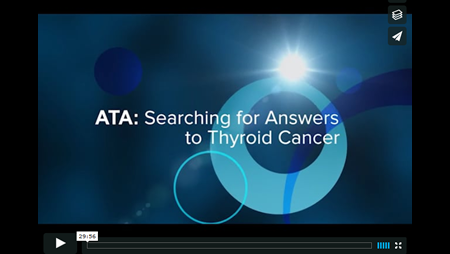Clinical Thyroidology for the Public summarizes selected research studies discussed in the previous month’s issue of Clinical Thyroidology, an official publication of the American Thyroid Association. Editor-in-chief, Alan Farwell, MD, FACE
Available in pdf format for saving and printing and Web page format for viewing online
PDF Format for Saving and Printing
Clinical Thyroidology for the Public Volume 14 Issue 2 (PDF file, 6.83 MB)
TABLE OF CONTENTS – Web Format
THYROID CANCER
Personalized treatment of anaplastic thyroid cancer has resulted in significant improvement in survival over the past two decades
Although rare, anaplastic thyroid cancer accounts for more than half of thyroid cancer-related death every year. In the last several years, there has been an increasing number of clinical trials investigating targeted, combination drug therapies in patients with anaplastic thyroid cancer. The goal of this study was to evaluate whether there has been an improvement in the overall survival of patients with anaplastic thyroid cancer over the past two decades, given the recent advances in the field.
Maniakas A et al. 2020 Evaluation of Overall Survival in Patients with Anaplastic Thyroid Carcinoma, 2000-2019. JAMA Oncol Aug 6;e203362. PMID: 32761153.
(PDF File for saving and printing, 743 KB)
THYROID CANCER
Should small, low-risk thyroid cancers even be called “cancer”?
Most small thyroid cancers are low-risk for both recurrence and spread outside of the thyroid and have an excellent prognosis. Because of this, experts wonder if it would be appropriate to change the terminology for the diagnosis. The current study is an analysis of 3 community focus groups of the general public conducted in Australia to consider a terminology change for small low-risk papillary thyroid cancer.
Shih P et al 2020 Terminology change for small low-risk papillary thyroid cancer as a response to overtreatment: Results from three Australian community juries. Thyroid. Epub 2020 Nov 25. PMID: 33238815.
(PDF File for saving and printing, 824 KB)
THYROID CANCER
Can the emotions about having papillary thyroid cancer or just the possibility of cancer affect how we make treatment decisions?
Patients with papillary thyroid cancer generally have excellent outcomes no matter how much of the thyroid is removed. However, we do not know much about how patients feel when diagnosed with papillary thyroid cancer or possibility of cancer, their concerns and how these emotions might affect treatment decisions. This study was done to understand the reactions of patients who were diagnosed with papillary thyroid cancer.
Pitt SC et al. 2020 Patients’ reaction to diagnosis with thyroid cancer or an indeterminate thyroid nodule. Thyroid. Epub 2020 Oct 3. PMID: 33012267
(PDF File for saving and printing, 932 KB)
THYROID CANCER
Quality of life after thyroid cancer surgery is decreased if parathyroid hormone levels are low after surgery
If all four of the parathyroid glands are damaged, or accidently removed, during surgery, calcium levels will be too low after surgery. This complication is usually only seen after a total thyroidectomy. The research described here studied people who had low parathyroid hormone levels after thyroid cancer surgery to better understand how these low levels effect the quality of a person’s life.
Büttner M et al. 2020 Quality of life in patients with hypoparathyroidism after treatment for thyroid cancer. J Clin Endocrinol Metab. Epub 2020 Dec 1. PMID: 32918085.
(PDF File for saving and printing, 740 KB)
HYPERTHYROIDISM
Frequency of low white blood cells in hyperthyroidism and the response to hyperthyroidism treatment
Uncontrolled hyperthyroidism can cause a decrease in the total count of one type of white blood cell known as neutrophils. As with the other systems, the low neutrophil counts return to normal once the thyroid hormone levels return to normal. What can be confusing in treating patients with hyperthyroidism is that a very low neutrophil count is a rare but dangerous side effect of antithyroid drugs used to control hyperthyroidism. This systematic review was done to evaluate how frequently low neutrophil counts are seen in patients with newly diagnosed and untreated hyperthyroidism.
Scappaticcio L 2020 Neutropenia in patients with hyperthyroidism: Systematic review and meta-analysis. Clin Endocrinol (Oxf). Epub 2020 Aug 16. PMID: 32799342.
(PDF File for saving and printing, 740 KB)
HYPERTHYROIDISM
Liver enzymes are commonly high in patients with untreated hyperthyroidism and improve after treatment of hyperthyroidism
When thyroid hormone levels are very high in hyperthyroidism, blood liver function tests can be also be increased to levels that suggest damage to the liver, even though severe liver problems from hyperthyroidism is extremely rare. What can be confusing is that the medications used to control hyperthyroidism can cause increased liver function tests that may indicate liver damage. This systematic review was done to evaluate how frequently elevated liver function tests levels are seen in patients with newly diagnosed and untreated hyperthyroidism.
Scappaticcio L et al 2020. Abnormal liver blood tests in patients with hyperthyroidism: Systematic review and metaanalysis. Thyroid. Epub 2020 Dec 16. PMID: 33327837.
(PDF File for saving and printing, 740 KB)








